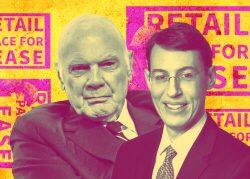About one-quarter of the Trump Organization’s New York City retail tenants either left or closed during the pandemic, according to an analysis by Forbes.
Prior to the pandemic’s onset, Trump counted more than 30 retail tenants in the city. New York Sports Clubs was one of the first to go, closing down at Trump Park Avenue in March 2020 before its parent company declared bankruptcy. Capital One left in May 2020 with a year and a half left on its lease.
Another troublesome location for Trump is 1290 Avenue of the Americas, where he owns a 30 percent stake. Forbes reported that after three of the property’s retail tenants shut their doors,Trump lost an estimated $500,000 in annual rent.
At 6 East 57th Street, where Trump owns 100 percent of the leasehold, Forbes reported Nike paid an estimated $16 million in annual rent before leaving and subleasing to Tiffany. The jeweler, however, is expected to vacate the property next year, creating the potential for a rent vacuum.
The retail news isn’t all bad for Trump. At Trump Tower, luxury fashion retailer Gucci renegotiated and extended its lease in February beyond 2026. Even there, however, Trump likely gave in to a rent reduction to secure the company long-term.
Read more


If there’s any comfort to be had for the former president, it’s that some industry leaders and indicators have signaled the worst of the retail market could soon be behind him.
Steven Roth, CEO of Vornado Realty — Trump’s co-owner of 1290 Avenue of the Americas — said in the company’s third-quarter earnings call the retail market in the city had bottomed out.
Roth added it would “take years for this market to recover, and it may never recover to the peak of 5 or 7 years ago.”
An October report by CBRE showed leasing activity, which includes new leases and renewals, increased for the first time since 2019. Direct ground-floor availabilities across 16 of Manhattan’s shopping corridors decreased in the third quarter, marking an 11 percent increase from the year prior, but the area’s first decline in availability since 2019.
[Forbes] — Holden Walter-Warner
